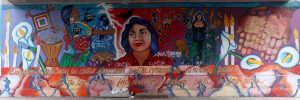
A new humanities course, Latinx Cultural Expressions, examines the relationship between Latinx identity formation, the arts, and epochs of social change and political engagement in the U.S. The course, developed by Karina Cespedes, PhD, and Stacey DiLiberto, PhD, allows students of Hispanic and Latinx descent to see themselves reflected in the curriculum and provides an additional opportunity for all students to learn about diverse cultures. It will first be offered by the Philosophy Department in the Spring 2021 semester.
After a brief historical examination of colonization and immigration and their legacy within Latinx communities, this class will focus on the art, music, film, and literature of Latinx communities in the U.S. that have crossed geographical boundaries and have emerged out of the social tensions of the 20th and 21st centuries.
The class expands conversations on race, class, gender, sexuality, and citizenship. It considers questions like:
- How does artistic expression open new possibilities for the construction of new social identities?
- How have Latinx artists made visible the intersections of race, class, gender, and sexuality?
- How are the works of writers, artists and thinkers understood within, and outside of, their respective cultural context in the U.S.?
- How have Latinx artists contributed to the U.S. and enriched the American cultural landscape?
Cespedes and DiLiberto say they want the course to help all students think critically about cultural diversity and the role it plays in their academic and professional lives. This course is designed to complement various interdisciplinary areas of study and potential careers where cultural literacy is beneficial, especially understanding the growing Latinx demographic in the United States.
Latinx Cultural Expressions HUM 3467, is open to all students who have completed ENC1101 or ENC1102. Students with questions can reach the faculty members at Karina.Cespedes@ucf.edu or Stacey.DiLiberto@ucf.edu.